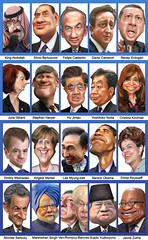| G-20 Leaders - Caricatures (September 2011) (Photo credit: DonkeyHotey) |
As Americans prepared to choose a president, Group of 20 finance chiefs said after talks yesterday in Mexico City that the U.S. pledged to avoid a "sharp fiscal contraction" in 2013. That's when $607 billion of automatic tax increases and spending cuts are set to take effect unless lawmakers act.
"Time is of the essence and significant policy uncertainty in Washington must be addressed," International Monetary Fund Managing Director Christine Lagarde told reporters. "It will be important for the U.S. to address quickly the so-called fiscal cliff."
The push for U.S. action took center stage at the G-20 meeting during which finance ministers also agreed to dilute their two-year-old budget-cutting goals. Their new vow, to ensure the "pace of fiscal consolidation is appropriate to support recovery," highlights increased concern that government belt-tightening would threaten an expansion the G-20 labeled modest.
The statement "reflects how the consensus has become less austere," said Torsten Slok, chief international economist at Deutsche Bank AG in New York. "Previously, austerity was thought best, but markets don't seem to believe that now and politicians are recognizing they have to be realistic over what can be achieved."
Fiscal Tightening
The IMF estimates the U.S. fiscal tightening, set to begin in January, is equivalent to 4 percent of gross domestic product, the most since the 1940s and about double the U.S.'s current growth rate. Resolution has been postponed until after today's election as Democrats back scheduled tax increases on the wealthy and Republicans prefer reduced spending.
While U.S. Treasury Secretary Timothy F. Geithner skipped the Mexico City meeting, Mexican Finance Minister Jose Antonio Meade said the U.S. officials present made a "clear promise" to pursue a bipartisan deal that would deliver "a path of public-finance sustainability, but not too much to put growth at risk."
The G-20's discussion of the U.S. marked a broadening in focus on fiscal challenges beyond Europe, whose three-year debt turmoil dominated recent talks among the world's leading industrialized and emerging economies. Those stresses have eased after the European Central Bank pledged to buy bonds and governments pursued closer banking supervision.
Don't Delay
"Europe is delivering on its commitment to do whatever it takes to safeguard the stability of the euro area," European Union Economic and Monetary Affairs Commissioner Olli Rehn said.
The G-20 still called on euro area policy makers not to delay enactment of crisis-fighting measures such as a banking union and to finish retooling their rescue fund to allow it to recapitalize banks.
Japan was urged to restrain a debt totaling 237 percent of GDP and its political impasse over funding this year's budget was identified as a threat to growth.
In promising not to jeopardize economic health with budget reductions, the G-20 governments changed their tone from a June 2010 summit in Toronto, when eight of the group's richest economies, aside from Japan, endorsed cutting deficits in half by 2013 and stabilizing or reducing debt as a share of GDP by 2016.
Mixed Progress
Progress has since been mixed with the latest IMF estimates showing only South Korea, Canada and Australia largely on course to meet both goals. The U.S., for example, faces a budget gap of 7.3 percent of GDP next year versus 11.2 percent in 2010, and a debt of 114.2 percent of GDP in 2016, compared with 98.6 percent in 2010.
The hand of those advocating a more measured retrenchment was strengthened by a mid-year global growth slump and signs that the prescribed austerity has not proved an elixir for Europe's woes. The IMF also modified its stance last month when it released research suggesting budget cuts have a bigger impact on economies than previously envisaged.
German Finance Minister Wolfgang Schaeuble, who oversees a budget almost in balance, nevertheless called paring excessive debt "unavoidable for sustained growth" and said others should "meet their obligations."
The G-20 said it will still ensure public finances are heading toward sustainability and told those countries with fiscal room to support growth. While policy makers said in their statement such nations had promised to underpin demand if it deteriorates, Russian Finance Minister Anton Siluanov said Russia and China were "skeptical" about the proposal.
New Targets
The group agreed that when officials next meet in Russia they will identify "credible and ambitious" new debt targets for beyond 2016, policy makers said in the statement.
The G-20 also said it remained committed to a full and timely implementation of new worldwide bank rules and to act by the end of this year to resolve a trans-Atlantic clash about over-the-counter derivatives. Global regulators set a September 2013 deadline to present tougher rules for money-market mutual funds, repurchase agreements and other so-called shadow banking activities.
The group restated past aims to move more rapidly toward greater market-determined exchange rate systems, refrain from competitive devaluations and avoid persistent currency misalignments.
Officials stuck to a January 2013 target for reviewing the way voting shares at the IMF are calculated, even though developed and emerging economies have so far disagreed on the method to use. ...

No comments:
Post a Comment